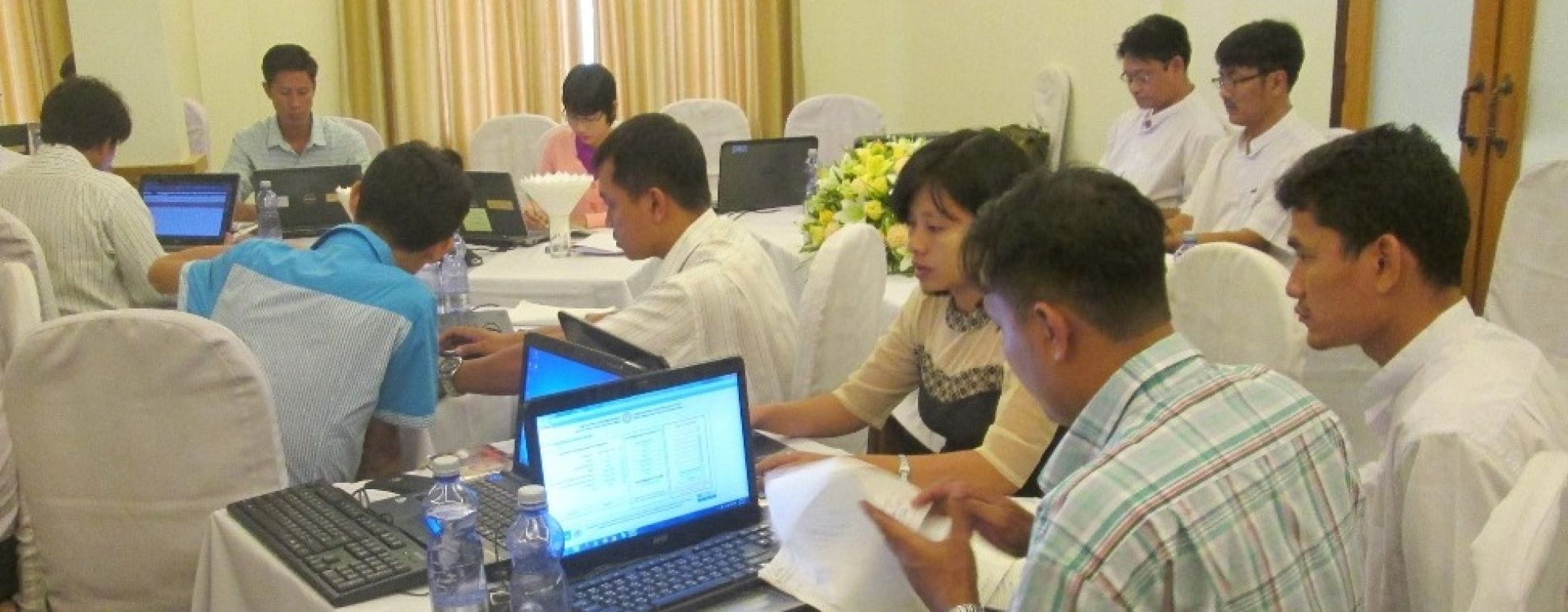
Training for improved surveillance and data management in Myanmar
13 November 2015Last month, Malaria Consortium – in partnership with the National Malaria Control Programme (NMCP), the World Health Organization (WHO) and the Centers for Disease Control and Prevention/President’s Malaria Initiative – held a training in Mon State to train members of the Vector Borne Disease Control staff at the Ministry of Health and data assistants at the WHO to use an innovative database system. The database will lead to improved surveillance, monitoring and evaluation in Myanmar.
Due to a shift towards a malaria elimination strategy in the country as well as the emergence of drug resistant malaria, surveillance of malaria cases has become a cornerstone of Myanmar’s national response. The data gathered from surveillance efforts informs strategy and allows policymakers to better guide the elimination strategy. As a result, proper data management is central to providing the foundation for a better understanding of the malaria landscape and allowing for a more targeted response.
The introduction of the Malaria Diagnosis and Treatment Database was meant to address existing gaps in data and to improve usability. Accompanied by a user manual written by Malaria Consortium, it allows users to easily enter data into the system, monitor data, and generate indicators and monthly reporting. In August and September, the database was piloted in Kyaikto and Padaung townships in order to test its potential for roll out at a larger scale. These pilots also informed further development by gathering feedback from users.
The training event brought together WHO data assistants as well as Ministry of Health staff from Mon State to be trained to use the system and scale up its use to all 10 townships of Mon State.
“It is essential that participants, both WHO data assistants and Vector Borne Disease Control staff, eagerly participate and gain knowledge and experience with this new Access Database,” said Dr Zaw Min Tun, Mon State Public Health Director. “This training will provide more effective and efficient data management at the state and township levels. It will also contribute to the professional development of the participants.”
Dr Nyan Sint, the Malaria Regional Officer of Mon State, also spoke at the event. “Our Mon state is the first to deploy this database towards the preparation of surveillance activities to malaria elimination,” he said. “It is important to effectively capture malaria data as well as to ‘test, treat and track.’ We must also strengthen coordination among NMCP and all partners.”
Twenty participants took part in the training sessions, which were largely based on the user manual and covered practical issues such as numbering of monthly forms, data and time settings, data entry and monitoring, indicators, reporting and troubleshooting. The result was a better understanding of surveillance system strengthening, improved use of malaria forms, increased familiarity with the new database and an updated list of township health facilities in Mon State.
Over the next few months, Malaria Consortium and partners will work together to roll out this system in other states that are covered by the Regional Artemisinin Initiative project, and will discuss how the system can be scaled up further to other statesand eventually to the national level.
Country: Myanmar
Keywords: Digital strategies | Surveillance
Related content
25 April 2014
Malaria Consortium stresses importance of fighting artemisinin resistance in Asia
15 October 2015Myanmar community members spearhead novel approach to eliminate dengue
10 August 2015First Malaria Indicator Survey in Myanmar kicks off in Yangon
Latest news
- Malaria Consortium honoured by Ugandan government for contribution to combat malaria23rd April 2024
- International summit calls for AMR accountability in public health interventions21st March 2024
- Global SMC community celebrates new milestone at SMC Alliance Annual Meeting in Nigeria6th March 2024
- Scaling up key interventions could halve pneumonia-related childhood mortality13th February 2024
- Malaria Consortium and eGov Foundation join Mozambique’s national malaria programme to digitalise seasonal malaria chemoprevention campaigns8th February 2024
- World’s first malaria vaccine rollout launched in Cameroon22nd January 2024